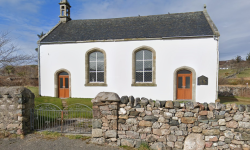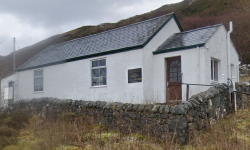John Mackay, Lairg
The Parish of Lairg was highly favoured in having secured the services in 1714 of John Mackay, one of the most outstanding ministers in the North of Scotland. He seems to have been raised up by the Head of the Church for special service, for he was eminently fitted for carrying on his official duties in the time when he lived and in the fields where he laboured.
By birth he was connected with some of the leading families in the Northern Highlands. His father, Captain Wm. Mackay, Durness, belonged to the Scourie branch of MacKays and was cousin to General Mackay who fought at Killiecrankie. Captain William fought at the Battle of Worcester. His son John, who was born in 1680, inherited the martial spirit of his race, and, had he chosen the army as his profession, would in all probability have had a distinguished military career, for he was a man of great energy and dauntless courage. But at an early age he became the subject of saving grace, and resolved to devote his life to the service of the Prince of Peace.
It was firmly believed in Sutherland that young Mackay was about that time privileged to come into touch with that notable servant of Christ, Mr. Thomas Hogg of Kiltearn, whose singularly holy life and fatherly counsels made a lasting impression upon him, a fact which later in life appeared in his calling one of his sons by the the Christian name of his benefactor.
His educational course was entered upon at Edinburgh University and later on was continued at Utrecht, and at both places he proved himself to be an able student. He was ordained minister of Durness in 1708. The duties to which the newly settled pastor had to address himself were of such an arduous nature as to demand all his energies. His parish, which embraced practically all Lord Reay’s policies, stretching from the River Borgie on the one side to Glencoul on the borders of Assynt on the other, was larger than some counties. But for such a field, the young minister was admirably fitted. He had a gigantic frame which served him in good stead in many a long journey, while his fearless spirit never failed him in administering faithful reproof when he saw it his duty to do so. His earnest piety too, marking him out as a true servant of God, inspired his people with respect, both for himself and for his ministry.
On one occasion when engaged in catechizing the families of his extensive parish, he asked the owner of the house in which the people were assembled whether all belonging to the household were present. “Oh yes,” was the reply, “All are here except a half-witted lad who looks after the cattle, but I did not think it necessary to call him in.” “Oh send for him,” said the minister, “for he has a soul.” Presently the lad appeared. When it came to his turn to be examined, the minister asked him whether he bad a soul. “Oh no, I have not,” said the youth. Instead of feeling disconcerted by such an apparently unhappy answer, the minister enquired, “Have you ever had a soul?” “Oh yes, that I had,” was the reply. “And what has become of your soul?” was the next question, to which the very striking reply was given. “I was once out herding and I felt my soul had become sick, for the pains of hell took hold of me. I soon found that I could not do anything for my soul, so I gave it over to Jesus and left it in his keeping; and, oh, Minister, that is what I mean when I said that I had no soul.”
Strong though Mr. Mackay was, the arduous an exacting duties of such an extensive parish preyed upon his energies to such an extent that his translation to Lairg in 1714 was truly welcome. In his new sphere of labour, there was a certain laxity in the life of the community which called for the imposition of a restraint which the new minister was well fitted to give. Sabbath profanation and other irregularities be set himself resolutely to suppress, and sometimes be did not hesitate to do so literally with a strong hand. One Sabbath Day, when he had gone to Shinness to preach, he came upon one of his parishioners engaged in shoemaking. The man happened to be cutting a piece out of a large hide of home-tanned leather just as the minister was passing. The latter rebuked him and bade him desist from such work on the Lord’s day; but the other, a man of powerful physique, at first refused, whereupon the minister seized hold of the leather to wrench it from his grasp. The shoemaker, however, held tight, and in the struggle the piece was torn asunder. This evidence of the power of the minister’s iron grasp at once gave him a place in the esteem of this knight of St. Crispin which nothing else could.
Another tradition shows that the minister of Lairg was not prepared to mince matters in the exercise of discipline. There was a conceited individual in the neighbourhood of the name of Robert Sutherland who caused no little trouble to the minister and his elders. On account of a glaring case of drunkenness in which be laid violent bands upon one of his neighbours, he was cited to a meeting of Kirk Session. He duly appeared, but adopted a defiant attitude and refused to express regret or to promise any reformation of his ways. The elders were greatly perturbed, but the fearless pastor made up his mind how to act. Turning to the delinquent, he calmly said, “Robert, will you meet me tomorrow afternoon where I generally go out for a walk that I may have a further talk with you about this matter.” Sutherland replied that he was quite willing to meet the minister when and where he liked. Next day the meeting took place beside Loch Shin. For some time the minister reasoned with Sutherland as they walked to and fro by the water’s edge but all in vain. Braggart though he was, the minister had an idea that Robert might not prove so obstinate under every circumstance, so seeing it was futile to argue any longer, be quietly said,” Robert can you swim?” “Not a stroke” was the reply. This was enough for the minister, and, seizing Robert by his coat collar, he plunged with him into the loch, and, still retaining his grasp, swam across to an islet about seventy yards from the shore. Before returning, the minister said to his refractory parishioner, “Now you see what your contumacy has brought upon you. When you are disposed to submit to discipline, let me know, for I can hear your cry at the Manse, and the ferry boat will be sent for you; but till then no boat will come near you. Meantime take as much exercise as you can lest you catch cold.” As the minister swam back, the man on the island hurled abuse after him and threatened to bring him before the civil and ecclesiastical courts. By and by matters developed just as the minister had anticipated. Robert knew that a neighbouring pool was reputed to be the haunt of the water-horse and all the tales he had heard since boyhood came trooping into his mind; the thought of spending the night there was more than he could endure. In the calm of the evening, there came from the islet a shout, not of defiance, but in tones which bespoke the feelings of a very different kind, “Mr. Mackay. oh do take me from this terrible place. I am willing to submit to your terms, and I faithfully promise never to give you or the Session any further trouble.”
The treatment meted out to Sutherland made such an impression upon the community that it invested the minister with an authority which few cared to dispute. Nevertheless, despite an apparent imperiousness in his attitude to his people, be had their best interests at heart and ever strove to persuade them to abstain from all appearance of evil and to follow that which is good. Nor were his efforts fruitless, for in a few years a pleasing change was to be seen in the ways and life of the community, while the church became thronged. Mr. Mackay was an earnest and faithful preacher of the Evangel and his efforts were owned in the conversion of souls. Besides the regular services of the sanctuary, diets of catechizing were well attended and family-worship became general.
Mr. Mackay was a good classical scholar and gave valuable assistance to promising lads in the earlier stages of their studies, so much so that the Manse of Lairg became a veritable “school of the sons of the prophets”.
A few of Mr. Mackay’s sermons are still in MS. They are, as might be expected, thoroughly evangelical, and in construction and substance they resemble the discourses of that eminent divine, Mr. Thomas Boston of Ettrick.
Mr. Mackay finished his course on 23rd February, 1753, in the seventy-third year of his age and the forty-sixth of his ministry. His wife Catherine was a woman of decided and ardent piety, the worthy helpmeet of a godly husband.
Donald Munro, Records of Grace in Sutherland, Free Church of Scotland Publications Committee, 1948.

